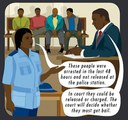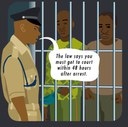This submission deals with South Africa’s performance in relation to, and compliance with, international standards with reference to offender management, offender rehabilitation and independent monitoring, as was requested by the Portfolio Committee on Justice and Correctional Services (the Portfolio Committee).
ACJR Publications

This guide is for anyone who needs a quick reference to the laws around arrest and detention in Malawi. This may include police, court clerks, prosecutors, magistrates, paralegals and detainees. First there is an orientation to the criminal justice system and a diagram and summary of what happens in Malawi around arrest and detention, page 1. The main part of the book focuses on what the Criminal Procedure and Evidence Code says. It starts with when and how arrest can happen and possibilities for release at the police station, page 4. This is followed by a section on how things happen in court and how people can be released by the court, page 12. There are special sections on the arrest and release of children, pages 7 and 11. There is also a list of children’s offences that are considered serious, see page 34, and there is a section on the maximum times allowed for the commencement and duration of trial, page 16. The rights of every person in Malawi, as well as the specific rights of those who have been arrested and detained are described, pages 18 - 21. The meanings of legal words can be found in the glossary near the back, page 22. At the very back is a long list of all the offences for which someone can be arrested in Malawi. These offences are divided into those that need a warrant for arrest, and those that do not, page 26
This fact sheet considers South African and International Law on the issue of solitary confinement and segregation.
This is the presentation made by Jean Redpath on an introduction to indicators at a seminar held in Cape Town in May 2015.
This is the presentation made by Jean Redpath on an introduction to indicators at a seminar held in Cape Town on 20 May 2015
This fact sheet was based on indicators developed by the Latin America Network for Pretrial Justice through country studies, analysis from past experience and a series of regional expert meetings.

Although this first edition published in 2015, this became available in electronic form in January 2019.
This report by the Zambian Human Rights Commission was based on a survey conducted to collect information on factors affecting access and conditions regarding bail among people found to be in conflict with the law in Zambia. The findings are meant to provide a basis for the review of current bail legislation relating to bail conditions in Zambia by promoting easy access for suspects or inmates to bail regardless of their social and economic conditions.
This article was published in AHRLJ Volume 15 No 1 2015. Although South African courts have expressly held that any evidence obtained through torture is always inadmissible, the author is unaware of a decision from a South African court to the effect that evidence obtained through cruel, inhuman and degrading treatment is, like evidence obtained through torture, inadmissible in all circumstances. In this article, the author first deals with the issue of evidence obtained through torture and thereafter relies on the practice of international and regional human rights bodies, such as the Committee against Torture, the Human Rights Committee, the UN Special Rapporteur on Torture, the UN Special Rapporteur on the Independence of Judges and Lawyers, the European Court of Human Rights and the African Commission on Human and Peoples’ Rights, and some of the sections of the South African Constitution, to argue that South Africa has an international obligation to exclude any evidence obtained through cruel, inhuman and degrading treatment. In support of this argument, the author relies on the jurisprudence of the South African Supreme Court of Appeal on the nature of the right to freedom from torture and argues that the same approach could be applied to the right to freedom from cruel, inhuman and degrading treatment

This poster explains the various time limits which apply to arrest and detention in criminal procedure in Malawi.

This poster explains how an arrested person can be released at court in Malawi criminal procedure.

This poster explains some of the rights contained in Malawi's Constitution.

